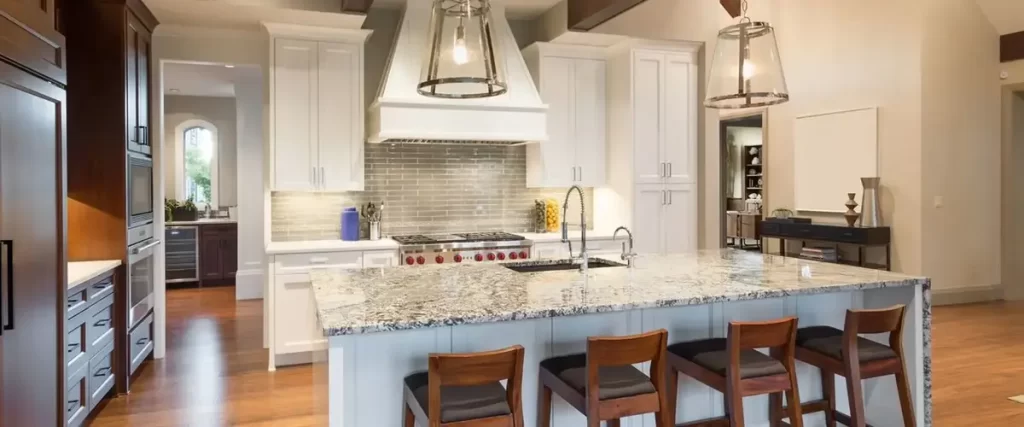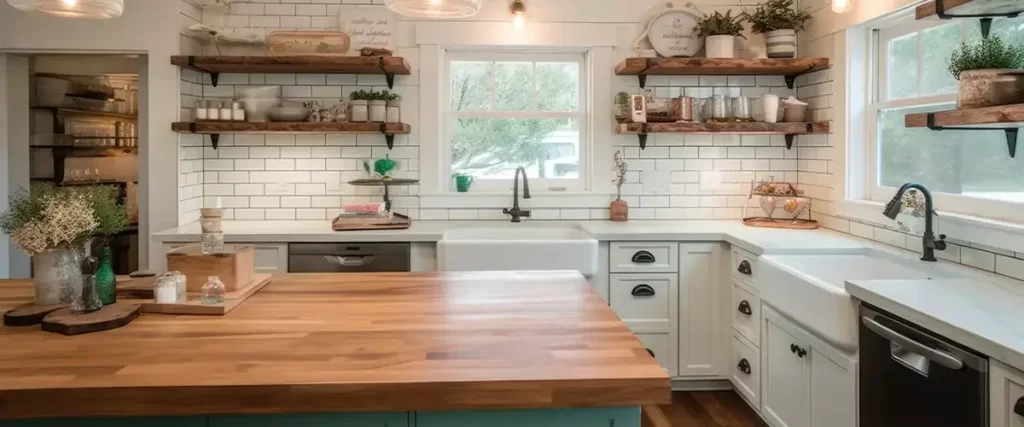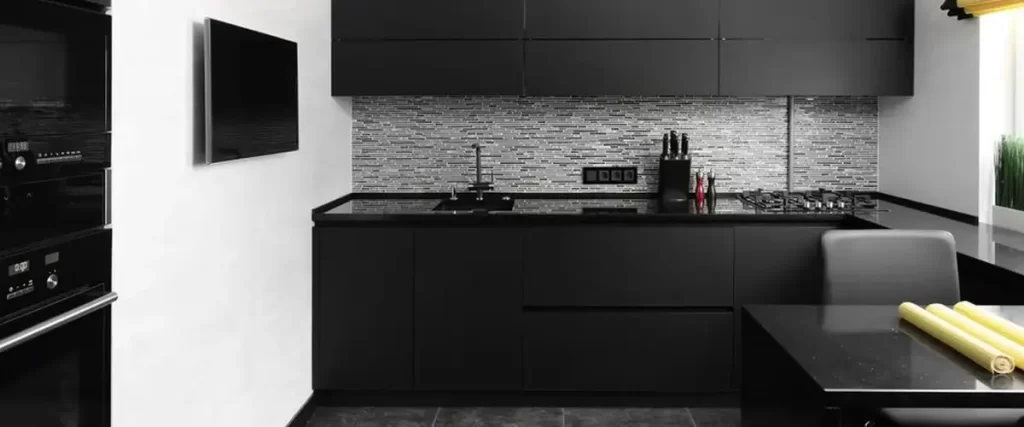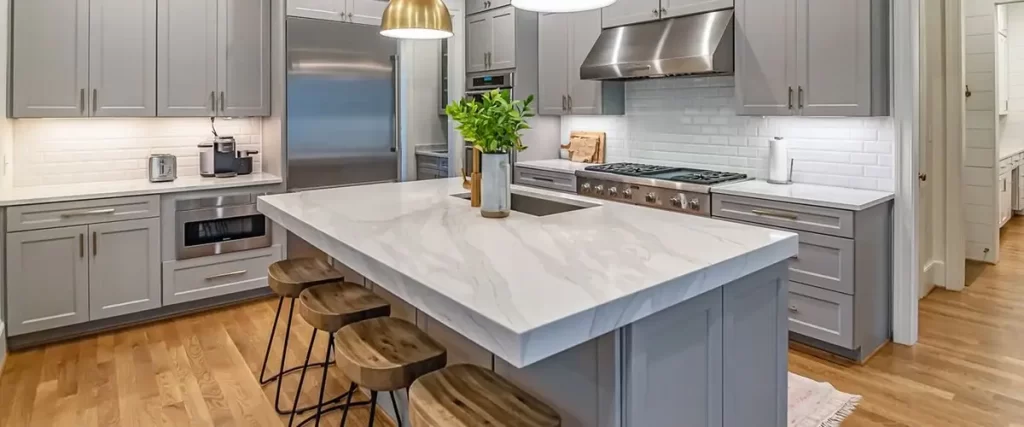A kitchen is more than a place to cook, it’s the heart of the home. Every family meal, coffee chat, and midnight snack happens there. So, when you’re planning a kitchen remodel, choosing the right countertop matters. It shapes how the space looks, feels, and functions every single day.
Homeowners often ask: what’s the best type of countertop for a kitchen? The truth is, it depends on your lifestyle, budget, and design goals. Some countertop materials handle hot pots with ease. Others bring natural beauty that instantly elevates a space. Some require regular maintenance, while others thrive with almost none.
Let’s walk through seven of the most popular countertop options, what makes each one special, and how they hold up in real homes.
1. Granite Countertops: The Classic Choice

Granite has earned its reputation as a kitchen favorite. Each slab is unique, filled with minerals that create patterns no engineered stone can truly match. For homeowners who love natural stone, granite feels solid, timeless, and grounded.
It’s highly durable, heat resistant, and handles daily wear with confidence. Hot pans, heavy dishes, or quick food prep, granite can take it.
However, granite requires sealing every few years to prevent stains from oils or acids. Cleaning it is simple: mild soap, warm water, and a soft cloth. Avoid harsh cleaners, and granite keeps its shine for decades.
Granite suits a variety of kitchen styles. Whether your home leans modern or rustic, the natural texture and variation bring warmth and character. It also adds significant home value, making it a smart long-term investment.
2. Quartz Countertops: Durable and Low-Maintenance
Quartz countertops, often called engineered stone, combine natural quartz crystals with resins and pigments. The result is a non-porous, consistent surface that’s stain resistant, scratch resistant, and nearly maintenance-free.
You’ll find quartz in every imaginable color, from bright white to charcoal gray. It works beautifully in modern kitchens where a clean, uniform look fits the design. Because quartz doesn’t require sealing, it’s one of the lowest-maintenance options available.
It also handles heat well but isn’t designed for direct contact with hot pots. A trivet is always a good idea. Quartz’s sleek surface pairs well with minimalistic cabinetry and metal finishes, creating a balanced, sophisticated feel.
3. Butcher Block Countertops: Warm and Inviting

Few countertop materials feel as welcoming as butcher block. Made from solid wood, often oak, maple, or walnut, it adds warmth and natural texture that softens hard kitchen surfaces. It brings a rustic charm and works beautifully in farmhouse or transitional kitchens.
Butcher block countertops are perfect for food prep, especially if you enjoy cooking from scratch. You can even cut directly on the surface, though using cutting boards will preserve the finish longer. The key to keeping it beautiful is regular maintenance. Apply mineral oil or conditioner a few times a year to prevent drying and warping.
Wood is softer than stone, so it can be easily scratched or dented, but that’s part of its appeal. Over time, the surface develops character. It’s budget-friendly compared to stone and adds a cozy feel that few synthetic surfaces can replicate.
4. Marble Countertops: Elegant and Luxurious
Marble has a natural beauty that’s impossible to ignore. Its veining patterns and soft color variations bring timeless elegance to any kitchen. Many homeowners fall in love with its natural stone appearance and cool surface, perfect for baking or pastry work.
Marble countertops are heat resistant and give a kitchen a high-end look. However, they require regular sealing and gentle care. The surface is softer than granite or quartz, which means it can scratch or stain if acidic foods or harsh chemicals are left unattended.
For those who appreciate patina and natural wear, marble ages gracefully. It’s best suited for kitchens where beauty and design take center stage and where homeowners are comfortable giving it a little extra care.
5. Concrete Countertops: Modern and Customizable

Concrete countertops have become a favorite for homeowners who want a bold, modern aesthetic. They’re completely customizable, you can shape them into nearly any form, add pigments for color, or embed decorative glass fragments and stones for texture.
Concrete is extremely durable once sealed properly. It resists heat, daily wear, and can handle heavy use. Like natural stone, it needs regular sealing to stay stain resistant. Its look fits industrial, minimalist, and modern kitchens beautifully.
Each piece is unique, with subtle color shifts and surface movement that give the material personality. Concrete is heavier than most materials, so professional installation is key. It pairs nicely with stainless steel appliances, natural wood shelves, and open-concept layouts.
6. Recycled Glass Countertops: Eco-Friendly and Eye-Catching
For homeowners looking for sustainability and sparkle, recycled glass countertops bring both. These surfaces combine crushed or recycled glass with concrete or resin, creating vibrant, translucent flecks that catch the light beautifully.
They’re highly resistant to heat and stains, easy to clean, and available in a wide range of colors. The surface feels smooth yet dynamic, ideal for homeowners who want something distinctive.
Because recycled glass is a composite material, durability depends on the binder used. Some require sealing; others are naturally non porous. Either way, they make a strong statement in contemporary and artistic kitchens.
7. Laminate Countertops: Affordable and Versatile

Laminate countertops remain a smart choice for homeowners on a tight budget. Modern manufacturing has transformed laminate into a surprisingly attractive budget-friendly option. With improved printing technology, it can mimic granite, marble, or wood with realistic depth and texture.
It’s lightweight, low maintenance, and easy to clean with mild soap and water. Laminate is heat sensitive and can scratch easily, so use cutting boards and trivets to protect the surface.
Despite its limitations, laminate delivers plenty of style for the price. It’s a practical choice for rental properties, first homes, or mid-range remodels where cost efficiency matters most.
Honorable Mentions: Tile, Soapstone, and Stainless Steel
Some countertop options don’t fit neatly into one category but deserve recognition.
Tile countertops are versatile and budget-friendly. They’re easy to install and repair, though grout requires cleaning and sealing. They come in every color and pattern imaginable, allowing complete customization.
Soapstone countertops are highly durable, heat resistant, and naturally dark gray. They develop a soft patina with age and need occasional oiling to maintain their rich tone. Soapstone offers quiet strength and understated beauty.
Stainless steel countertops deliver a sleek, professional look often seen in commercial kitchens. They resist stains, heat, and bacteria, making them ideal for serious cooks. Over time, they can show fingerprints and minor scratches, but many homeowners enjoy that industrial character.
How to Choose the Best Type of Countertop for Your Kitchen
Selecting the best countertop for your kitchen involves more than comparing price tags. Think about how you use your kitchen day to day. Do you cook frequently? Do you prefer a low maintenance option or don’t mind regular sealing? How important is appearance compared to function?
Here’s how to narrow it down:
- For durability and easy care: Quartz or granite.
- For warmth and natural appeal: Butcher block or soapstone.
- For design flexibility: Concrete or recycled glass.
- For budget-conscious remodels: Laminate or tile.
- For luxury and timeless appeal: Marble.
Also consider resale value. Stone surfaces like granite and quartz tend to attract buyers, while wood or concrete appeal to homeowners who value personality and craft. Every choice brings its own sense of style and practicality.
Think about long-term upkeep, too. Materials that require sealing or oiling may need more time and attention. If you prefer a set-it-and-forget-it surface, engineered or synthetic materials might fit your lifestyle better.
A Few Care Tips That Go a Long Way
Regardless of the material, all kitchen countertops last longer with proper care.
Simple habits make a big difference:
- Use cutting boards to prevent knife marks.
- Clean spills quickly with mild soap and water.
- Avoid harsh chemicals and abrasive pads.
- Use trivets or pads under hot pots and pans.
- Reseal natural stone or concrete surfaces as recommended.
Good maintenance preserves the aesthetic appeal of your kitchen and protects your investment.
Let’s Make It Easier
Choosing the best type of countertop for your kitchen can feel like a lot of decisions: materials, color, sealing, maintenance, and installation. Each option offers its own mix of function and beauty, and the right one depends on how you live and cook.
If you’d rather skip the research and get expert guidance from a team that’s built and remodeled kitchens for years, Gill Construction can help. We’ll walk through your ideas, suggest materials that fit your lifestyle, and handle every step of the kitchen remodel from design to installation.
To start planning your dream kitchen, call us at (254) 369-5978 or message us here. We’ll help you choose the perfect countertop and build a kitchen that feels like home.
